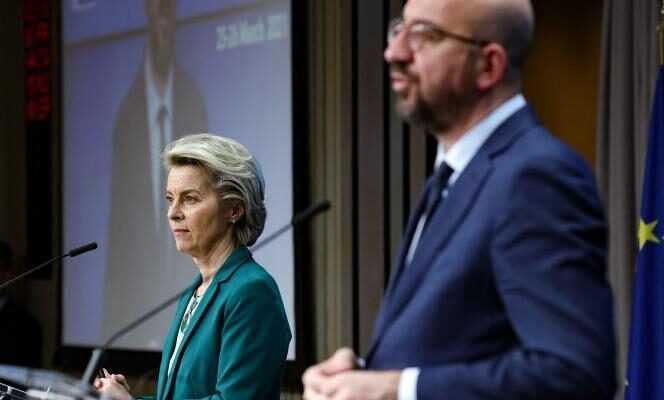Difficulties in the supply of vaccines against Covid-19, at the heart of a heated dispute between Brussels and London, dominated the European Union (EU) summit on Thursday, March 25.
Brussels wants “Its fair share of vaccines” : the Swedish-British laboratory AstraZeneca must ” catch up “ its significant delays in delivering its vaccine against Covid-19 to the Twenty-Seven before exporting the doses produced there outside the European Union (EU), warned the President of the European Commission, Ursula von der Leyen, after a videoconference summit.
Companies must honor their contract
The vaccine export control mechanism aims in particular to ensure that “Companies honor their contracts with the EU before exporting elsewhere in the world”, underlined the head of the European executive. AstraZeneca delivered to Europeans only 30 of the 120 million doses promised in the first quarter.
In their final declaration, the Twenty-Seven stress that“Accelerating the production, deliveries and deployment of vaccines remains essential and urgent to overcome the crisis” and “Efforts in this direction must be intensified”.
The summit was also an opportunity for progress: the EU and London could reach an agreement on Saturday on the supply of vaccines, said Dutch Prime Minister Mark Rutte. “It would be welcome, because we are friends and need each other”, he added at a press conference.
Anxious to speed up vaccination, the European Commission on Wednesday toughened its mechanism for controlling vaccine exports, in order to drastically restrict them to countries which themselves produce doses or whose population is already widely vaccinated. This principle of “Reciprocity” implicitly targets the United Kingdom, to which the EU has exported 21 million doses since December – without receiving in return any vaccine produced across the Channel, while its contract with AstraZeneca provided for deliveries from British factories.
A short exchange with the American president
In the evening, the President of the United States, Joe Biden, joined the meeting by videoconference, shortly after his first press briefing at the White House, in which he announced that he was doubling his goal of vaccinations against the Covid. 19 for his first 100 days in office.
“America is back. We are glad you are back », said Council President Charles Michel, welcoming the Democratic leader, calling for “A new transatlantic state of mind”.
The last participation of an American president in a meeting of European heads of state and government dates back to 2009, when Barack Obama attended an EU-US summit.
“By standing side by side, the EU and the US can show that democracies are best able to protect their citizens, promote dignity and serve prosperity”, at tweeted Mr. Michel.
Emmanuel Macron puts pressure on the EU
At the end of the summit, the French president, for his part, underlined the slowness of an economic nature. Emmanuel Macron felt that Europe should “Improve” its economic and budgetary response to the Covid-19 crisis so that the recovery is “More vigorous” and does not diverge too much from that of the United States.
“This is one of the lessons of the crisis for Europe as well as for France: we need to drastically simplify our responses. We are too slow, we are too complex, we are too stuck in our own bureaucracies. “
Summarizing the discussions with the twenty-six other EU leaders, Macron stressed that the end of the crisis was passing “By maintaining budgetary support measures for as long as the[it] the health crisis and the rapid implementation of the European recovery plan ” 750 billion euros, which was adopted in July.
With this commitment “Extremely strong”, the EU “Brought a response to the height” following the first wave of spring 2020. But, after the second and third waves, “We will undoubtedly have to complete this answer”, he added.
